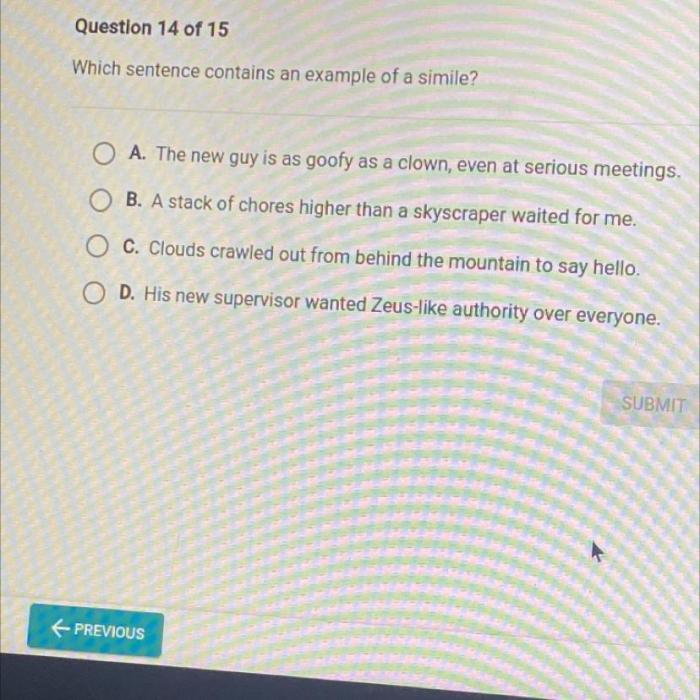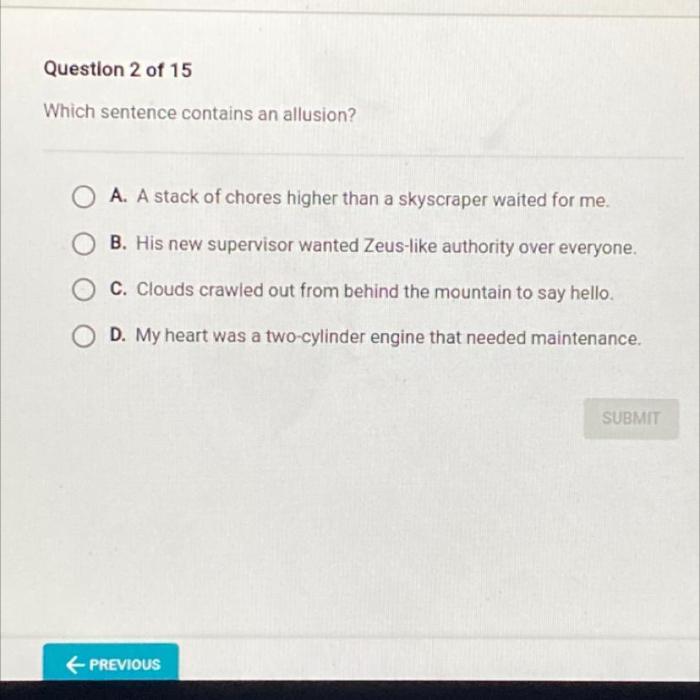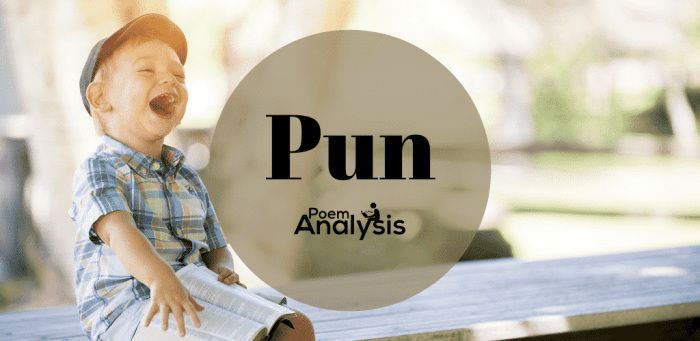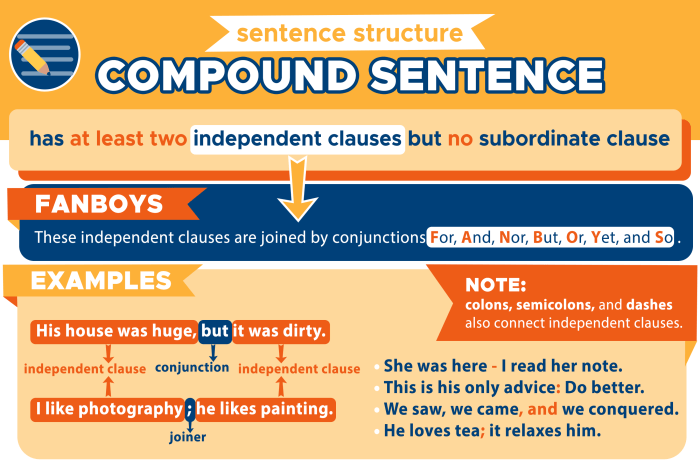Which sentence contains a pun – Prepare to embark on an enlightening journey into the world of puns, where sentences take on a playful and enigmatic character. We’ll delve into the anatomy of puns, uncovering their clever structure and diverse forms. Join us as we explore the art of identifying puns, analyzing their sentence structure, and appreciating the nuances of punctuation and emphasis that elevate their humor.
Throughout our exploration, we’ll encounter captivating examples that showcase the boundless creativity of language. We’ll dissect the wordplay and double meanings that breathe life into puns, unraveling their humorous intent.
Pun Definition and Structure

A pun is a play on words that exploits the multiple meanings of a word or phrase. It is a form of wordplay that relies on the ambiguity of language to create humor.
Puns can be classified into several types, including:
Homophonic Puns
- Puns that rely on words that sound alike but have different meanings, such as “I’m afraid for the calendar. Its days are numbered.”
Homographic Puns
- Puns that use words that are spelled the same but have different meanings, such as “Time flies like an arrow; fruit flies like a banana.”
Compound Puns, Which sentence contains a pun
- Puns that combine two or more words to create a new meaning, such as “I’m an archaeologist. My career is in ruins.”
Identifying Puns in Sentences: Which Sentence Contains A Pun
Identifying puns in sentences requires an understanding of their key elements and distinguishing them from other figures of speech.
Key Elements of Puns
- Homonyms:Words that sound the same but have different meanings or spellings.
- Paronyms:Words that sound similar but have different meanings or spellings.
- Double Entendre:A phrase or sentence with two possible meanings, one of which is usually humorous.
Distinguishing Puns from Other Figures of Speech
Puns differ from other figures of speech in the following ways:
- Metaphors:Imply a comparison without using “like” or “as.”
- Similes:Compare two things using “like” or “as.”
- Hyperbole:Exaggeration for emphasis.
Sentence Structure Analysis

Puns often rely on the structure of the sentence to create their humor. By playing with the arrangement of words, puns can create multiple meanings or unexpected interpretations.
Double Meanings and Wordplay
Puns often involve double meanings or wordplay, where a word or phrase can have multiple interpretations. This can be achieved through:
- Homonyms:Words that sound the same but have different meanings (e.g., “bat” as a flying mammal or a sports equipment)
- Homographs:Words that are spelled the same but have different meanings (e.g., “wind” as a noun or a verb)
- Pivoting:Shifting the focus of a sentence to create a new meaning (e.g., “I’m not afraid of heights; I’m afraid of widths.”)
- Malapropisms:Using an incorrect word in place of a similar-sounding one (e.g., “I’m feeling very celery today.”)
Punctuation and Emphasis

Punctuation and emphasis play a crucial role in enhancing the humor of a pun. A well-placed comma or a strategic use of italics can elevate a pun from merely clever to downright hilarious.
The Power of Punctuation
Punctuation marks can create pauses and emphasis, highlighting the different meanings in a pun. For example, consider the pun: “What do you call a fish with no eyes? Fsh!”
The exclamation mark at the end emphasizes the unexpected and humorous twist. Without it, the pun would lose much of its impact.
The Importance of Emphasis
Emphasis can also be achieved through italics, bolding, or capitalization. By highlighting certain words or phrases, you can draw attention to the pun’s punchline and make it stand out.
For instance, the pun: “Why did the scarecrow win an award? Because he was outstanding in his field!”
The capitalization of “outstanding” emphasizes the double meaning and makes the pun even more effective.
The Role of Context
It’s important to note that the humor in a pun often relies on the context in which it is used. The same pun may not be as funny in a different situation or with a different audience.
For example, the pun: “What do you call a belt made out of watches? A waist of time!”
Out of all the sentences that contained puns, one that really stood out was “The officer was arresting a mime, but he kept giving him the slip.” This hilarious pun is a perfect example of wordplay and humor. And speaking of police, have you checked out the CDA police daily activity log ? It’s a fascinating glimpse into the daily lives of police officers.
This pun would be more humorous in a context where people are discussing fashion or accessories.
Examples and Illustrations

To solidify our understanding of puns, let’s delve into a treasure trove of examples. These sentences showcase the witty play on words that characterizes puns, revealing the hidden meanings and evoking laughter.
Sentence Examples
Let’s explore a variety of puns in sentences and unravel their humorous essence.
| Sentence | Type of Pun | Explanation |
|---|---|---|
| “I’m an archaeologist. My career is in ruins.” | Homophone | The pun hinges on the dual meaning of “ruins” as both a place of historical significance and a state of destruction. |
| “What do you call a fish with no eyes?” | Rhetorical | The answer to the question, “fsh,” is both the punchline and a play on the word “fish.” |
| “I lost my mood ring, and I don’t know how to feel about it.” | Irony | The humor lies in the contradiction between the lost object’s purpose (indicating emotions) and the speaker’s inability to feel due to its absence. |
| “Time flies like an arrow. Fruit flies like a banana.” | Parody | This pun parodies the proverb “Time flies like an arrow” by replacing “arrow” with “banana,” creating a humorous twist. |
| “I’m not a hoarder, I’m just a very selective archaeologist.” | Oxymoron | The pun combines the seemingly contradictory terms “hoarder” and “archaeologist” to create a humorous exaggeration. |
FAQ Resource
What exactly is a pun?
A pun is a play on words that exploits the multiple meanings of a term or the similarity of sound between two words.
How can I identify a pun in a sentence?
Look for words or phrases with multiple meanings or that create a humorous effect through unexpected combinations.
What is the purpose of punctuation in a pun?
Punctuation can emphasize certain words or phrases, enhancing the humorous intent and making the pun more apparent.